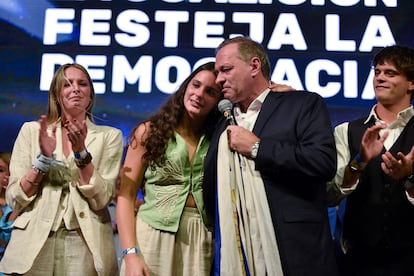José Mujica’s left returns to power in Uruguay
Yamandú Orsi defeated the conservative candidate Álvaro Delgado in a race marked by civility. The outcome bucks the populist, conservative trend on display elsewhere in the Americas, from Milei in Argentina to Trump in the US
It was celebrated like a goal in the final match of a World Cup. Thousands of people waiting for the results of the presidential elections on the Montevideo promenade erupted in cheers when the screen showed the first exit poll of the night. Yamandú Orsi, the candidate for Frente Amplio (Broad Front), the man chosen by former president José Mujica to regain power for the left, had 49% of the votes, compared to 46.5% for Álvaro Delgado, of the ruling conservative National Party. Official polls later confirmed Orsi’s victory: with 99% of votes counted, he had 49.8% compared with 45.9% for his rival, a difference of 92,000 votes in a country of 3.5 million people. Uruaguay’s president, Luis Lacalle Pou, did not wait for the figures to be released by the election authorities to congratulate the winner: “I called Yamandú Orsi to congratulate him as the president-elect of our country, and to place myself at his orders and begin the transition as soon as deemed appropriate,” he wrote on social media.
“I am going to be the president who calls again and again for national dialogue,” Orsi said on stage in a speech of no more than 10 minutes. “The message cannot be other than to embrace the debate of ideas. That is how you build a democratic republic. Long live Uruguay’s political parties. The country of freedom, equality and fraternity, which is nothing more and nothing less than tolerance and respect for others, has triumphed once again. Let us continue on this path”, he added. The defeated Delgado quickly answered: “If a hand is needed for the good of the country, this coalition is willing to offer both.”

The Uruguayan left is returning to power after five years of government by the National Party. The right and the center-right participated in the run-off under the aegis of the Republican Coalition, which also added the Partido Colorado (Red Party), another century-old force, as well as three smaller groups, including the far-right Cabildo Abierto. But it was not enough to stay in government. Although the country’s economic figures are not bad, Delgado did not succeed in seducing an electorate that felt that Uruguay was stagnating. The vote for a renewal will not lead to a significant change of tack, but instead represents a “safe change,” according to the Frente Amplio’s campaign slogan.
Uruguay has thus halted the conservative wave that began in Argentina with Javier Milei and was finally consummated in the United States with the victory of Donald Trump. The democracy of this small South American country is an anomaly in a region plagued by a crisis of political parties and dwindling representation. This has been an old-fashioned campaign, with low-intensity confrontations and calls for respect.
“It is the victory of a people, a people that is getting rebellious,” said Fernando Pereira, president of the Frente Amplio, in statements to EL PAÍS. “It was thought to be very difficult, but the FA is the most voted force. The merit goes to the thousands of men and women who worked on the ground, in each location, in each city, who gave us lodging in the tours, all the people who helped us to make this miracle called Frente Amplio.”
Economy, poverty, security
The left returns with a commitment to maintain macroeconomic stability and improve income distribution, prioritizing the situation of the 10% of the population that lives in poverty. To carry out this task, Orsi has appointed Gabriel Oddone, an economist with a social democratic background who comes from the private sector and has been a consultant for numerous international organizations. Under Oddone’s leadership, the FA will seek to accelerate economic growth through policies aimed at promoting investment and increasing productivity. In the last decade, economic growth averaged 1% annually.
The economy is among the main concerns of Uruguayans, according to a ranking by the consultancy Cifra, with the top concern being public safety. With a rate of 11.2 homicides per 100,000 inhabitants, the situation in Uruguay is not among the most critical in Latin America, but it is double the world average. In 2023, Montevideo accounted for 55% of the 382 homicides, which occurred mainly in the poorest neighborhoods in the northeast of the capital, partly associated with the increase in drug trafficking.
The FA proposes to provide “immediate responses” to poverty and public safety through “ambitious and transformative solutions.” In these two critical areas, it proposes reforming the social protection system to address the poverty that affects 20% of children under 6 years of age, and creating a Comprehensive System to Fight Organized Crime and Drug Trafficking.

Mujica and the new Parliament
Mujica, 89, voted early in the morning at a school in Cerro, a neighborhood near the farm where he lives. There he spoke of his expectations regarding the incoming government: “I personally have nothing to hope for, my immediate future is the cemetery, but I am interested in the fate of young people, who when they are my age will live in a very different world,” he said. He was also asked about his relationship with the government of Javier Milei in Argentina. “We have to try to make it as good as possible, but it is difficult,” he said.
In the next legislature, “the need to negotiate” will prevail, stressed Mujica, referring to the configuration of the new Parliament that will begin its journey in 2025. “To negotiate, a mood must be created,” he warned. In this sense, the FA has an advantage in terms of governability because it achieved a majority in the Senate with 16 seats. The situation is different in the House of Representatives, where it will have to seek agreements to push through, among other projects, the budget law.
The FA obtained 48 seats in the House of Representatives, two less than the number required to achieve an absolute majority. In this scenario, it may consider holding separate talks with the legislators of the parties that until now made up the governing coalition and that, together, obtained 49 deputies. Otherwise, the key to the majority would be in the hands of the new member of Parliament: Identidad Soberana (Sovereign Identity), an anti-system, anti-vaccine, anti-Agenda 2030 party, which will have two lawmakers under the leadership of lawyer Gustavo Salle.
Sign up for our weekly newsletter to get more English-language news coverage from EL PAÍS USA Edition
Tu suscripción se está usando en otro dispositivo
¿Quieres añadir otro usuario a tu suscripción?
Si continúas leyendo en este dispositivo, no se podrá leer en el otro.
FlechaTu suscripción se está usando en otro dispositivo y solo puedes acceder a EL PAÍS desde un dispositivo a la vez.
Si quieres compartir tu cuenta, cambia tu suscripción a la modalidad Premium, así podrás añadir otro usuario. Cada uno accederá con su propia cuenta de email, lo que os permitirá personalizar vuestra experiencia en EL PAÍS.
¿Tienes una suscripción de empresa? Accede aquí para contratar más cuentas.
En el caso de no saber quién está usando tu cuenta, te recomendamos cambiar tu contraseña aquí.
Si decides continuar compartiendo tu cuenta, este mensaje se mostrará en tu dispositivo y en el de la otra persona que está usando tu cuenta de forma indefinida, afectando a tu experiencia de lectura. Puedes consultar aquí los términos y condiciones de la suscripción digital.








































